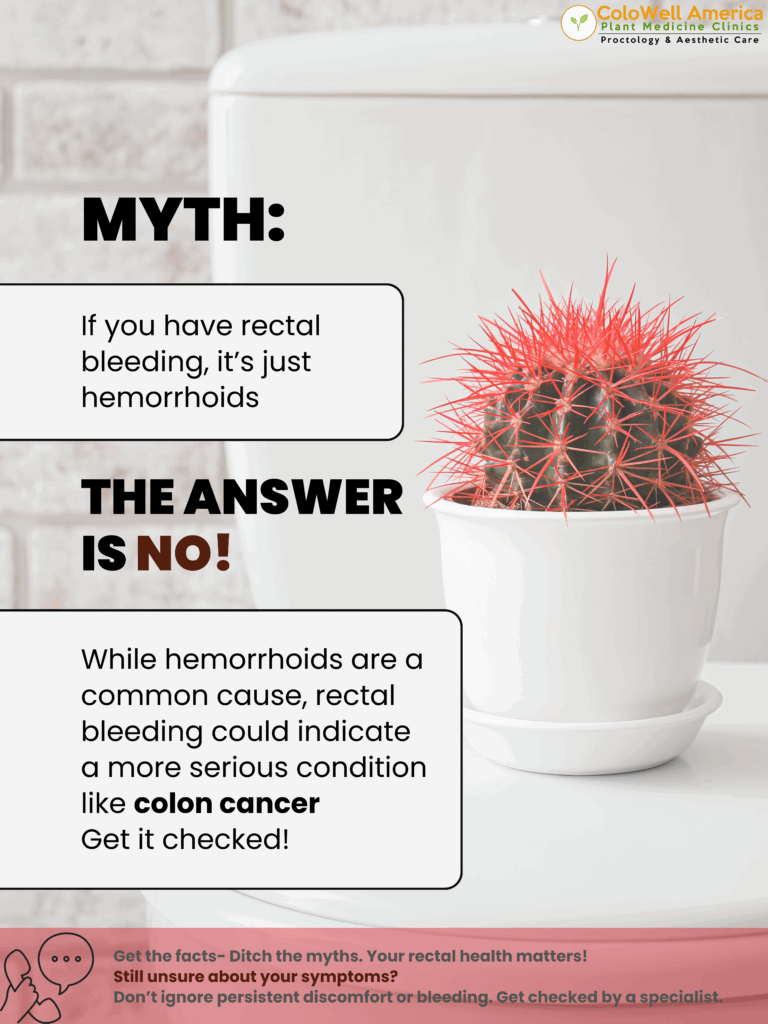Hemorrhoids are surprisingly common and often misunderstood, affecting millions of people across all ages and backgrounds. Despite how frequent they are, myths and misconceptions about hemorrhoids abound, creating unnecessary anxiety and confusion for those affected. Today, let’s bust some of the most popular myths and provide some clarity on what hemorrhoids really are and how they can be managed.
8 Hemorrhoid Myths That Just Aren’t True!
Myth #1: Spicy Foods Cause Hemorrhoids
Fact: Spicy foods might feel intense going down, but they’re not the root cause of hemorrhoids.
Spicy foods can sometimes trigger stomach upset or make existing hemorrhoids feel more irritated, but they don’t directly cause hemorrhoids. Hemorrhoids develop due to pressure on the blood vessels in the rectal area, most commonly from straining, chronic constipation, or pregnancy. So, while it might be a good idea to moderate spicy foods for digestive comfort, rest assured they’re not the source of hemorrhoids.
Myth #2: Only Older People Get Hemorrhoids
Fact: Hemorrhoids can affect people of any age.
It’s true that hemorrhoids are more common as we age, but younger adults can and do get hemorrhoids as well. Lifestyle habits like diet, lack of exercise, and even genetics play a big role. Factors like prolonged sitting, heavy lifting, or not drinking enough water can also increase the risk. So, whether you’re young or old, maintaining a healthy lifestyle can go a long way in preventing them.
Myth #3: Hemorrhoids Are Permanent
Fact: Hemorrhoids can be managed and are often temporary.
If you’re living with hemorrhoids, know that they’re not necessarily a lifelong condition. Many hemorrhoids improve with lifestyle adjustments, dietary changes, and over-the-counter treatments. In some cases, medical procedures may be needed to shrink or remove them, but it’s uncommon for hemorrhoids to persist when managed properly. If yours haven’t gone away after a week or so, it might be worth consulting a doctor to explore effective treatment options.
Myth #4: You Can See All Hemorrhoids
Fact: Hemorrhoids can be internal and thus invisible from the outside.
Not all hemorrhoids are external. Internal hemorrhoids occur within the rectum, and they might not cause noticeable symptoms until they enlarge or start to prolapse. So, even if you can’t see or feel anything externally, you could still have hemorrhoids. This is why symptoms like rectal bleeding or discomfort should be checked by a healthcare provider to rule out other potential issues.
Myth #5: Hemorrhoids Are Always Painful
Fact: Hemorrhoids can range from painless to painful depending on the type and severity.
Hemorrhoids can cause a plethora of symptoms, including itching, discomfort, and bleeding, but not all hemorrhoids are painful. The level of discomfort often depends on the size, type, and location of the hemorrhoid.
Myth #6: Hemorrhoids Always Require Surgery
Fact: Surgery is typically a last resort for treating severe hemorrhoids.
Most hemorrhoids respond well to non-surgical treatments, such as a fiber-rich diet, Sitz baths, and topical creams. Options like rubber band ligation or Sclerotherapy can be effective for more persistent hemorrhoids without the need for traditional surgery.
Surgical intervention is usually a last-resort option for those who have exhausted all other treatments.
Myth #7: Hemorrhoids Only Happen to People Who Strain
Fact: Straining can increase risk, but other factors also contribute.
Straining during bowel movements is indeed a common cause, but it’s not the only one. Other contributing factors include prolonged sitting, pregnancy, obesity, and even a family history of hemorrhoids. Staying hydrated, eating enough fiber, and exercising regularly can reduce the risk even if you do have to strain occasionally.
Myth #8: Creams and Ointments Cure Hemorrhoids
Fact: Topical treatments can relieve symptoms but won’t cure hemorrhoids.
Creams and ointments available over the counter are helpful for easing symptoms like itching and discomfort, but they don’t eliminate hemorrhoids. These products soothe the area and provide temporary relief, but long-term management generally involves dietary changes, good hygiene, and, if needed, professional treatments.

When Should You See a Specialist?
Hemorrhoids are typically harmless, but if you experience prolonged symptoms, such as bleeding, significant pain, or recurring issues, it’s time to seek medical advice.
Persistent rectal bleeding, especially, should never be ignored! As it can sometimes indicate other conditions, including Colorectal Cancer.

Takeaway: Know the Facts and Find Relief!
While myths around hemorrhoids persist, understanding the facts can make managing them a lot easier. Hemorrhoids don’t have to be a permanent problem, and there are many effective treatments available. At the ColoWell America of Tampa, our experts are there to help you get back to living comfortably, Hemorrhoid-free!
-Disclaimer-
The information provided on this website is for educational and informational purposes only and is not intended as medical advice. Always consult with a qualified healthcare provider regarding any medical concerns, conditions, or treatment options. Individual results may vary. The information provided or services described are not intended to diagnose, treat, cure, or prevent any disease. Any medical or aesthetic procedure should be discussed thoroughly with a licensed professional before beginning treatment.

